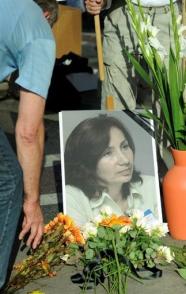
PACE: the North Caucasus is “Beset by Violence”
Publication: Eurasia Daily Monitor Volume: 6 Issue: 181

The Parliamentary Assembly of the Council of Europe has issued a new report highlighting the deteriorating human rights and security situation in the North Caucasus. The report’s author, Swiss parliamentarian Dick Marty, said on September 30, one day after the report was issued: "In April 2009, the Russian government announced the end of the operations in Chechnya. Now, however, the entire region is beset by violence" (www.assembly.coe.int, September 30).
The report by the European human rights body states that "paramilitary groups set up by illegal combatants" in the North Caucasus are becoming "increasingly organized, coordinated, widespread and technically well-equipped again." It adds that such groups are more frequently targeting senior regional officials, that suicide bombings have become a recurring tactic this year and that the number of civilian victims of terrorist attacks is increasing.
The report says that this past summer saw "an unprecedented jump" in the activity of armed insurgents in the North Caucasus. "It is significant that, since the beginning of 2009 the victorious statements announcing that terrorism has been crushed in the region that were so frequent in previous years have been far less triumphalist in tone," the report stated. It added: "In fact, several senior officials and elected representatives including the President of the Russian Federation, Dmitry Medvedev, acknowledge that the impression that the North Caucasus was becoming more peaceful was wrong. The conflict has not died out or become more localized. Instead, it is threatening to spread to republics which have been relatively calm to date, namely Kabardino-Balkaria and North Ossetia-Alania."
According to the report, 142 members of the security forces in the North Caucasus were killed and 280 injured during the three summer months of 2009 – the highest level of losses among the police and the army in four years (compared to 82 dead and 169 injured in summer 2008, 63 dead and 134 injured in 2007, 83 dead and 210 injured in summer 2006, and 102 dead and 265 injured in summer 2005). The report says that terrorist attacks have claimed victims not only among the security forces but also among the civilian population, noting that in Ingushetia, terrorist attacks on civilians have become more frequent since the summer of 2008, "targeting customers of gaming rooms and cafés as well as religious leaders and public officials." This past summer, the report highlights, a wave of attacks targeting senior civil servants swept Dagestan and Ingushetia and killings of local Russian-speakers resumed "after a long break."
Abuses by the security forces, including abductions, torture, degrading treatment, extra-judicial executions and trials on trumped-up charges, "continue unabated" in the North Caucasus, the report states. "Furthermore, the situation of almost complete impunity for crimes committed by members of the security forces during anti-terrorist operations seems to endure," it adds. "Nothing is known about what has happened to most missing persons and the people responsible are hardly ever called to account," according to the report. Security forces in Chechnya, Ingushetia and Dagestan "usually state that all persons killed during special operations are combatants who resisted arrest," but the bodies of those killed often bear "signs of torture" and witnesses say that they were abducted "by often unidentified members of the security forces." Human rights activists fear there are "death squads" operating in the region, comprised of "local security force units including local elements of federal bodies, whose activities are not supervised by the federal authorities."
The PACE report examines the situation in Chechnya, Ingushetia and Dagestan individually and cites a number of specific cases of human rights abuses throughout the region. It also examines what it calls the "wave of killings of human rights defenders," including the case of Natalya Estemirova, the Memorial human rights activist who was abducted in the Chechen capital Grozny on July 15 and found murdered in neighboring Ingushetia later that day. The report notes that some of her fellow activists, including Memorial head Oleg Orlov and Moscow Helsinki Group Chairwoman Lyudmila Alekseyeva say the circumstances of Estemirova’s killing "point to the Chechen security forces’ involvement" and the "direct responsibility" of Chechen President Ramzan Kadyrov (https://assembly.coe.int/CommitteeDocs/2009/ajdoc43_2009.pdf).
Kadyrov is suing Orlov for defamation for saying that he was responsible for Estemirova’s death. However, the Memorial head said as the trial began on September 25 that he stands by his comments about the Chechen leader. Orlov told reporters outside the Moscow courthouse where the trial got underway that there is "no doubt of the political guilt of Ramzan Kadyrov" in Estemirova’s murder. As the Associated Press noted, Orlov has never said he had evidence of Kadyrov’s direct involvement, but has repeatedly blamed Kadyrov for Estemirova’s murder, citing an atmosphere of lawlessness and impunity which he said Kadyrov has fostered. The news agency quoted Orlov as saying that he rejected an offer from Kadyrov for an out-of-court settlement in which he would drop the monetary damage demand if Orlov issued a public retraction. Orlov called the offer "strange."
Orlov also claimed that Kadyrov had "directly, publicly, on television equated rights defenders with terrorists, bandits and criminals," thereby endangering the lives of human rights activists in Chechnya (AP, September 25).




